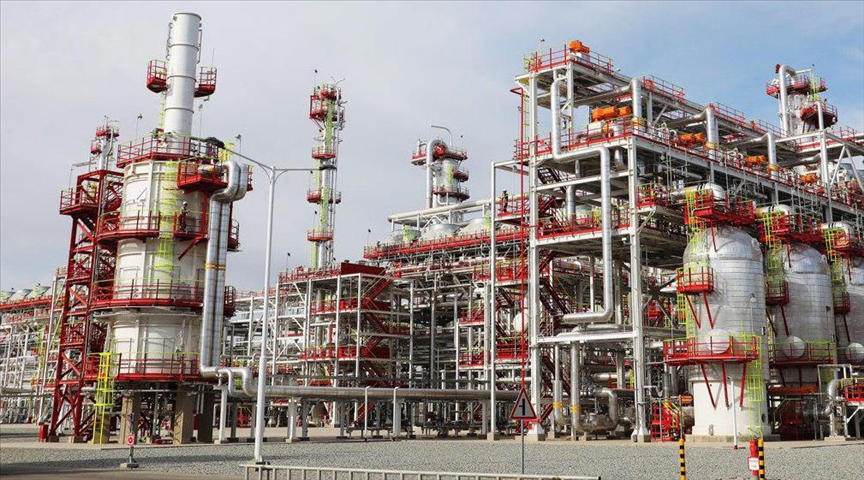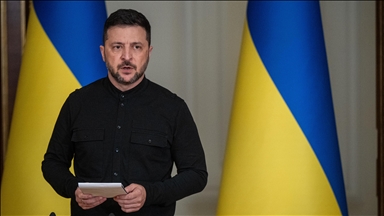 FILE PHOTO
FILE PHOTO
ISTANBUL, ANKARA
Tensions in Eastern Europe have been on the rise since Russia intensified its aggression in Ukraine, leading the EU to consider the expansion of sanctions on Russia, which would put around 3.4 million barrels a day (bpd) of Russian oil exports to the bloc at stake.
This had led to the question of whether EU countries, the largest buyer of Russian oil, can live without Russian oil imports.
Not in the short term
Russia, as the world’s largest oil exporter, meets about 8% of global demand, with the EU the largest recipient.
Although the EU says it is keeping the prospect of a Russian oil export ban on the cards to pressure Russia, Julien Mathonniere, an oil markets economist at Energy Intelligence Group, told Anadolu Agency that such a move is not possible, “at least not in the short term.”
According to the International Energy Agency (IEA), Russia exported an average of 7.5 million bpd of oil and oil products last year, out of which approximately 3.4 million bpd was destined for the EU, including 2.2 million bpd of crude oil and 1.2 million bpd of petroleum products.
This constitutes approximately 45% of Russia's total oil and petroleum products exports and 25% of the EU's total oil imports.
IEA data shows that out of 3.4 million bpd oil and petroleum products imported by the EU countries from Russia last year, some 2.7 million bpd was seaborne while the remaining 700,000 bpd was supplied through pipelines.
One of the important routes of Russian oil in the EU-Russia oil trade is the Druzhba oil pipeline.
The line, which supplies oil to landlocked refineries in Central and Eastern Europe, transports Russian oil in the north via Belarus to refineries in Poland and Germany. On the southern side, it passes through Ukraine and reaches refineries in Hungary, Slovakia and Czechia.
Russian seaborne crude exports were transported from the ports of Primorsk and Ust-Luga in the Baltic Sea and Novorossiysk in the Black Sea to different ports in the Netherlands, Italy, France, Spain and Portugal.
Can EU substitute Russian oil?
According to Mathonniere, this is unlikely.
“We have seen a lot of political gesticulation recently around potential, alternative supply sources. But the reality is that none of them matches Russian oil in terms of volumes, availability, and flexibility of supply,” he said.
However, the unfolding sanctions and diplomatic efforts to stop the Russian conflict with Ukraine continue to be the focal point of global oil markets.
US President Joe Biden is due to participate in a series of meetings in Brussels beginning March 24, including a NATO summit and European Council meeting, to discuss ongoing western concerns on the Russia Ukraine war.
A possible oil embargo on Russia is also expected to be assessed during these meetings.
However, not all EU countries are eager to bring sanctions on Russia’s oil and gas sector, as Germany on Tuesday reiterated its opposition to energy sanctions on Russia, warning that it could have negative consequences for European economies.
German Chancellor Olaf Scholz was also hesitant with such action and said European countries should carefully assess the proposed measures which may have repercussions for the bloc’s economy.
The possible expansion of sanctions against Russia is cementing concerns that new supply shortages may arise in global oil markets.
Europe needs to look for different supply sources, like Middle East
If the oil trade between the EU and Russia is fully halted, approximately 3.4 million bpd of Russian oil and petroleum products will be out of the market.
Although Russia still supplies oil to the European buyer via pipelines, the country's seaborne oil transport is facing difficulties.
Given that the market is already tight and under a lot of stress due to the shrinking demand-supply gap, uncertainty whether other alternative suppliers are able to bridge the supply gap from the loss of Russian oil, or whether they will be willing to do so, gives way to the threat of serious supply shocks globally.
It is widely agreed that substituting Russian oil is easier than substituting Russian gas since most of Europe's crude oil imports are seaborne, however, experts say that this is still difficult to achieve in the short term.
“The additional problem is that Europe must not only cover for crude, but also for refined products. Urals crude, Russia’s flagship export blend to Europe, flows at about 2.4 million bpd to European refiners. But products represent an additional 1.4 million bpd of supply to Europe, Russian diesel being the main export staple,” Mathonniere said, taking into account the difficulties of substituting Russian crude oil compared to other oil products.
Europe has a capacity problem for oil product supplies, he said.
He was wary of the ability of European refineries to cope with processing alternative feedstock with the Russian product shortfall, if available, especially after the recent refinery closures and conversions.
“Europe will need to buy from elsewhere, like the Middle East,” he said, noting that the continent is in a real supply conundrum.
“Buyers looking for sour crude face a reputational risk if they pick up distressed Russian oil cargoes as Shell did recently. But on the other hand, there are very few alternative options and the market still needs those grades to meet demand.”
As a result, Mathonniere said buyers have been forced to stick with Russian oil, with the trade now “going dark.”
“The oil is still flowing, technically still not under sanctions for now, but trades are done at arm’s length and out of sight between Russian sellers and buyers, with international trading houses stepping in as middlemen,” he said.
Anadolu Agency website contains only a portion of the news stories offered to subscribers in the AA News Broadcasting System (HAS), and in summarized form. Please contact us for subscription options.







